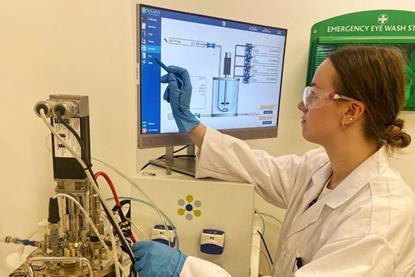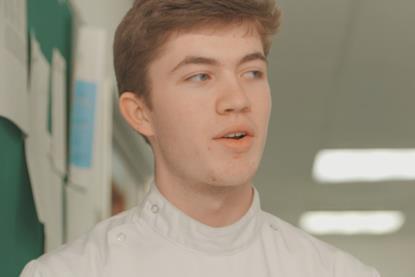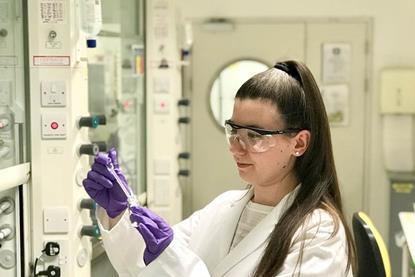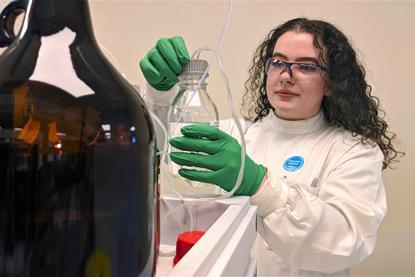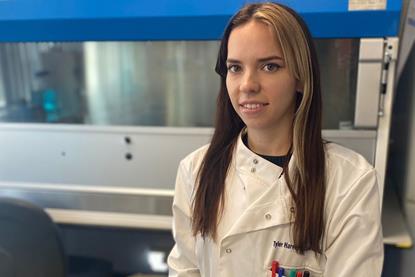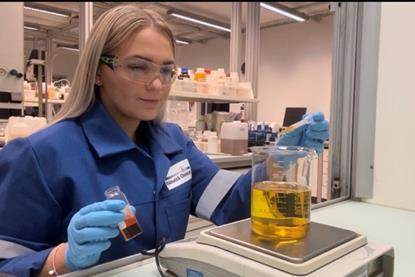Earn while you learn
Work-based training in chemistry
A three or four year science-related degree is not the only route into a career with chemistry. If you are not sure about going to university full time but are interested in pursuing a career in chemistry and gaining qualifications then a work-based qualification or apprenticeship could be for you. Some options are also suitable if you are thinking about retraining for a career in chemistry, or if you did not choose the right subjects or get the grades you needed.
Real-life stories from apprentices
Peptide chemistry apprentice
Christina uses chemistry to make medicines work better and help more people
Bioleaching lab technician
Emma collects and processes precious metals that are extracted from electronic waste products
Laboratory analyst and higher degree apprentice, water
Joseph helps ensure there is clean, safe, water for 15 million people in the UK whilst studying towards his chemistry degree
Quality officer, genomics research
Gary helps scientists make breakthroughs by ensuring the data they use is accurate and reliable.
Process chemist – higher apprentice, pharmaceuticals
Erin helps turn new medicines into finished products so that they can be mass-produced for patients.
Senior laboratory technician
Olivia uses analytical techniques to ensure that food products meet legislative requirements for consumers
Associate scientist, pharmaceuticals
Holly develops new medicines at a global pharmaceutical company, AstraZeneca alongside completing her degree apprenticeship
Analyst – higher apprentice, organic chemistry
Katty RSciTech monitors the levels of organic materials in drinking and wastewater across the Thames Water catchment area. She was also the Royal Society of Chemistry’s 2020 Chemical Sciences Apprentice of the Year.
University laboratory technician apprentice
Tyler carries out experiments linked to covid-19 reseach and lung diseases
Bionanotechnology PhD student
Lewis is researching cutting edge ways to improve the treatment of diseases of the colon
Laboratory scientist apprentice
Kasia makes lubricants to improve the performance of metal-cutting tools while also studying towards a degree in chemical science
Laboratory technician and higher apprentice, solar
Rebekka tests and finds ways to improve solar panels whilst balancing her studies towards her Foundation Degree apprenticeship
What are the benefits of work-based qualifications?
Most work-based qualifications are designed with input from employers, meaning you will develop the skills and knowledge that employers look for in their industry. The combination of a qualification and work experience will also help you stand out to future employers and support your long-term career.
What does an apprenticeship contain?
A science-based apprenticeship contains a number of common elements across the UK and Ireland. They are:
- Paid work doing a real job with responsibility. Apprentices are paid at least the minimum pay for apprentices (£7.55p/h from April 2025) although science roles are usually paid a higher rate.
- Developing core skills such as numeracy, communication and team work
- Knowledge, skills and behaviours applicable to the occupation with the possibility of a qualification that meets the standards set by the relevant industry
- In England, an end-point assessment that will test the skills, knowledge and behaviours you have learnt during your apprenticeship to make sure you can do your job.
You will spend a minimum of 20% of your contracted hours dedicated to off-the-job training, which supports your development in the workplace. This training is typically delivered by an external training provider (private provider, colleage or university) who will support you to develop the knowledge and skills required for the occupation.
Learn more about the work-based study options near you orhow to search for and apply for work-based training or an apprenticeship.
Who can do an apprenticeship or work-based qualification?
Anyone! The entry requirements for work-based qualifications vary by the type of course and the level of study. Some qualifications require at least five GCSEs in chemistry, maths or science at grade C or above, but this varies. There are also no age restrictions. If you have a learning difficulty or disability then in some cases the entry requirements have been adapted so check with your local training provider.
Where will an apprenticeship take you?
Once you have completed your apprenticeship you will hold a nationally recognised certificate, and in some instances a qualification, employability skills and professional experience. Whichever route you take, you will be able to advance in your career and many apprentices go on to senior roles within their companies.
-
Progress to the next level - your progression options vary based on where you are based in the UK. In England, Wales and Northern Ireland after you complete your advanced apprenticeship you can look for a higher apprenticeship, and in England you could progress on to a degree or masters level apprenticeship. In Scotland, you can look at a modern or technical apprenticeship. In Ireland, you can progress onto level 7 laboratory analyst apprenticeship.
-
Keep working in your current role, or find a new job - whether you need to find a new job or can continue in your current role is dependent on the contract you signed. If you signed a permanent contract then you can continue working as you are a permanent member of staff. If you signed a fixed-term contract then you will need to find a new job. Many apprentices go onto working in areas such as polymer processing, process manufacturing, forensics, or science or laboratory technician.
Become a registered science technician or registered scientist
The Registered Science Technician (RSciTech) and Registered Scientist (RSci) professional awards recognise the skills, knowledge and professionalism of working scientists. You will be able to demonstrate your professional standards through the addition of post-nominal letters after your name. In time you may also progress to gain recognition as a Chartered Chemist.
Registered Science Technician (RSciTech) is for advanced apprentices, technicians and technical support staff and is highly regarded. Upon completing your advanced apprenticeship you are eligible to apply for the award. The Registered Scientist (RSci) award is for those working in scientific, higher technical support roles or undertaking a higher apprenticeship. Candidates will typically be qualified to at least Level 5 and will be applying this knowledge to their roles.
Getting recognition for your apprenticeship - how the RSC celebrates and supports apprentices
Day-in-the-life
@royalsocietyofchemistry Day in the life as a Chemistry Apprentice! 👩🔬 Did you know you can get paid and study at the same time? 🤯 Join Kasia around the lab to find out what it's like to work as a chemist at Italmatch Chemicals, while also studying for a degree at @Manchester Metropolitan Uni 📚🔬 Kasia's experiments and tests make sure the lubricants used for sealing cans are safe, whilst keeping the food and drink fresh. #NationalApprenticeshipWeek #DayInTheLifeUK #DayInTheLife #Chemistry #Apprenticeships #ApprenticeshipUK #DegreeApprenticeships #STEM #NAW2025 ♬ original sound - The Royal Society of Chemistry
The five best things about a degree apprenticeship
@royalsocietyofchemistry Did you know you can have a career in chemistry without the need to go to university? Kasia works in a chemicals lab at Italmach Chemicals and explains why a chemistry degree apprenticeship was the best thing for her after she left school, and how it could even secure you a job afterwards! #nationalapprenticeshipweek #NAW2024 #LearnOnTikTok ♬ Spring - Ningen
Useful links
- England: National Apprenticeship Service
- Wales: Careers Wales
- Scotland: Apprenticeships Scotland (or Apprenticeships in Scotland)
- Northern Ireland: NI Direct
- Republic of Ireland: Laboratory apprenticeship
- European Commission: information on apprenticeships
- Not going to uni
- Amazing apprenticeships
- The student room
- Disability rights UK
- Apprentice ambassador network









